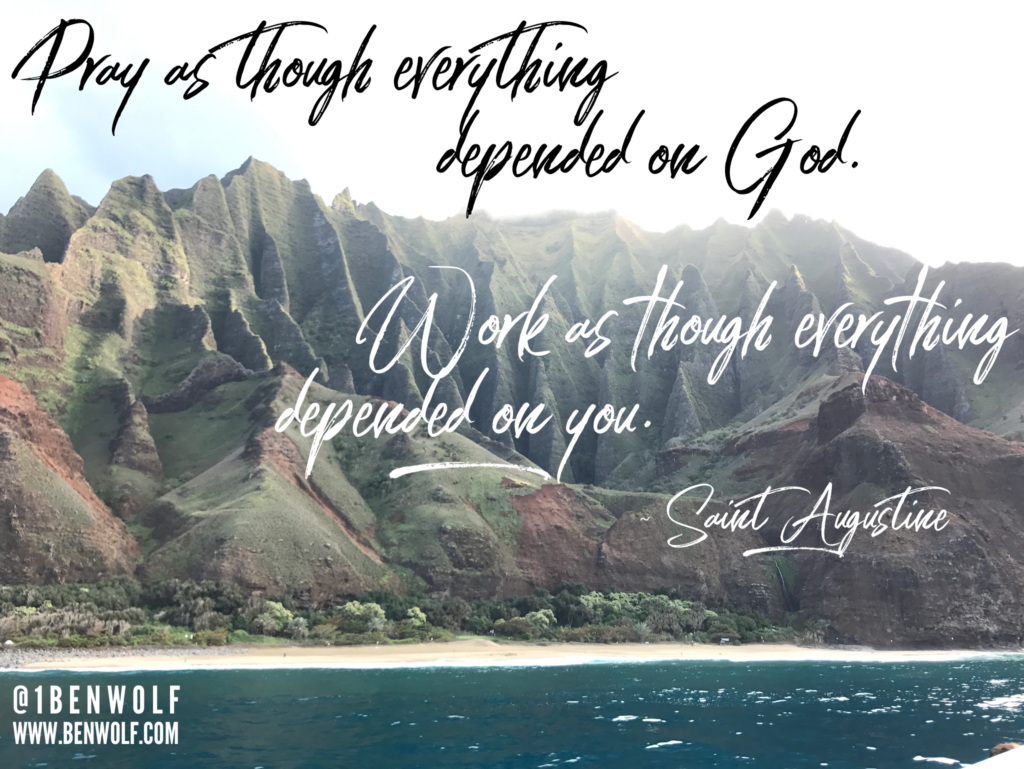
A sickness has infected the Christian creative community, and it’s especially prevalent in Christian writing and publishing circles. I call it the “Good Enough” Fallacy.
And it’s a fatal sickness.
The “Good Enough” Fallacy, defined simply, is the theory that as a Christian author, all you have to do is write the best book that you can, and then God will take care of the rest.
Some authors actually believe that writing the book is where their job ends. Whether or not it sells is up to God’s will. Seriously… people have told me that repeatedly over the years, both in person and online.
But it’s a fallacy because it doesn’t align with Scripture or reality. Obedience doesn’t stop 1/3 of the way through your calling.
*Please Note that much of what I write in this post is geared toward authors who are trying to write full-time and/or who are serious about getting their work professionally published. If you’re a hobbyist, the standards are lower, and that’s fine. But if this is your calling in life, then pay attention.*
A Range of Extremes
Like pretty much everything, the “Good Enough” Fallacy has a range of extremes. Some authors literally only write the book (the first draft) and assume it’s ready to go.
Some authors self-edit their work to death and then push it out there, either to agents or editors, or they self-publish.
Some authors hire skilled editors and capable cover designers so they can put out a good project on their own, but they stop there and expect God to handle the marketing.
The approach varies from person to person, but they’re all wrong because they stop short of what God has actually called them to do and instead rely solely on Him to “make something happen.”
Marketing
Most Christian authors I’ve interacted with tend to draw their line at marketing. They rely on the Heavens to send them book sales when they should be doing everything they possibly can to get the book out there and put copies into people’s hands.
That doesn’t work. This calling is similar to that of the Great Commission—we need to go out into all the world and spread our work (share our books) like we’re spreading the Gospel.
We cannot solely rely on God to bring the increase if we haven’t first planted and watered. I sometimes imagine God up there on His throne, looking down on some of us and saying, “What are you doing? I gave you this gift, and you’re only using half of it.”
Marketing is the other half of the publishing business. If you don’t want to learn it, pay someone to do it for you, or expect lackluster results.
Reality Check
Be honest: would you treat any other aspect of your life this way? Any other profession? Absolutely not.
When a plumber is working the pipes in your house, does he pray that they fix themselves? Or does he use his training as a plumber to fix them and earn his wage?
When an electrician fixes an electrical outlet, does he anoint it with oil and hope it fixes itself? Or does he use his training as an electrician to fix it and earn his wage?
Would we, as Christians, treat our own faith this way? “I’ll become a Christian, and God will take care of the rest.”
Literally no one teaches that, yet for some reason, we’re content to liberally apply that logic to our publishing careers. That’s why this is a fallacy—it doesn’t apply anywhere in reality, nor is it scriptural. (In fact, the opposite is true–check out Ecclesiastes 9:10 and Colossians 3:23.)
Not in it for Sales
On a thread about publishing, someone recently asked me online, “are we only looking for a best seller or to get the message out?”
Um… if you don’t sell any books, how will you get the message out? And if you hit a bestseller list, aren’t you getting your message out all the more?
Do you think Chick-Fil-A isn’t in it for the sales? Or Hobby Lobby? Are they wasting their time and lives selling chicken sandwiches and neon-colored craft glue, or are they fulfilling their purpose and making a living doing it? (Check out Proverbs 10:4, good buddy.)

A principle from Scripture is that if God calls us to do certain things, He will provide a way for those things to get done.
When it comes to a career in publishing, as a Christian, I’m not relying on God to magically land me a publishing contract, find me readers, create a book cover for me (or bless me with divine skills to do it myself), and so on. Those things are up to me to handle and figure out.
Nor am I solely publishing message-based fiction. That’s not the genre I’m targeting, and readers of certain genres expect certain types of content to either be present or not present at all (like profanity).
To suggest that “getting the message out” is the only thing of importance is to ignore the tried-and-true methods of how to make a living at this thing God has called us to do. How can we do this thing well if we don’t eventually earn enough from writing to focus on writing and writing alone? (And what’s the “message” behind delicious chicken sandwiches and/or neon-colored craft glue, anyway?)
Seriously—if our attention is divided, and if we truly believe that writing is God’s will for us, how can we properly focus on doing it in a way that is honoring to Him? “No one can serve two masters,” after all.
So what’s the answer?
“Study to Show Thyself Approved”
“Study to show thyself approved” is the starting point.
Spend time in researching what genre you’re writing in, learn how to market better using AMS and Facebook ads and promotional sites and building newsletters, etc. Invest money to hire people to handle the things you’re no good at (I’m talking about book covers and editing in particular).
To do anything less is to dishonor God and what He’s calling you to do. All of this stuff can be learned, and you can gradually build your following, your sales, and your career. And with that larger platform, you’ll be able to affect more people for Christ.
Scripturally, take a look at Psalms 33:3 ESV—note that “skillfully” is the operative word in that passage.
Excuses, Excuses
The “good enough” fallacy is so dangerous precisely because it contains a grain of truth—but it’s a truth that has been twisted for any number of reasons, including self-justification for poor sales/low readership/bad reviews.
- “It must not have been God’s will for my book to sell.”
- “The agents and editors don’t like my story. It wasn’t the right fit. I’ll find someone else to publish me.”
- “I wrote a crossover book for both secular readers and Christian readers, but it just hasn’t caught on yet.”
- “The audience I’m writing for is just too small,” or “The audience is out there, but there’s no way to reach them.”
- “I made my own book cover because I couldn’t afford it.” (Or, more accurately, “…because I didn’t prioritize my publishing expenses appropriately.”)
- “I edited it myself. I have an English degree, after all.”
- “That reviewer needs Jesus,” or “That reviewer just doesn’t ‘get it.’”
All of this needs to be addressed. We can’t keep lying to ourselves on these topics. We need to take ownership of the calling God has given to us, and we need to make things happen.
A quote attributed to St. Augustine rings true in this regard: “Pray as though everything depended on God. Work as though everything depended on you.”

If we don’t try to improve ourselves, if we don’t try to change our approach to this business of publishing, then we’re burying the talent given to us by our master. That didn’t work out very well for that servant. I recall weeping and gnashing of teeth—otherwise known as “what every Christian author does when their books don’t sell well enough.”
It’s all well and good to seek God for answers. But He will not do the work for us. If we expect Him to sell our books, why not also expect Him to write our books? We Christians tend to draw these arbitrary lines where we feel can get away with it spiritually, but all it does it hinder us and keep us from fulfilling God’s calling for us.
Conclusion
A friend of mine brought up the metaphor of being a gardener vs. being a farmer to me, and I thought it was applicable to this situation.
A farmer’s livelihood depends on creating/growing a bunch of crops and bringing them to the market to sell.
By comparison, a gardener is more of a hobbyist, and taking their products to market isn’t necessary for them to survive.
If you’re going to be a farmer in this industry, you have to do everything you can to sell your product. Raise them properly so they’re high-quality crops. Dress them up. Make a sign. Tell people about how awesome your crops are. Offer them at a fair price. If your crops don’t sell, you don’t eat, and you can’t keep being a farmer.
If you’re a gardener, and your crops are just for you and your family and maybe some friends to enjoy, that’s totally fine. But don’t go telling farmers that “it’s the nutrition of the crops that matters” (and not whether anyone buys them or not), or that “it’s God’s will whether you sell crops or not.”
“Good Enough” is never good enough. Nothing short of professional excellence will do.
If you’re staking your livelihood on publishing, you have to do more than just hope.
You have to work at it, long and hard. In the process, you’ll actually please God, and then maybe you’ll find success, too.

I appreciated your thoughtful and thought-provoking article.
Perfect.
I totally agree Ben. We need to be leaders in excellence.
Thank you for this – it’s a good article and makes some valid points. I generally agree with 90% of it. As Christians, we don’t expect God to provide for our families without also doing our best to find a job and perform that job to our best ability.
Why should writing be different? There is a balance of work and trust, and we have to be strong in both. We offer our best to God – and that includes offering our best work, doing all that we can do. Then we trust God to make it fruitful. But if we offer the leftovers, or whatever happens to come off the top of my head with no effort, why should we expect God to honor that?
The point where I think this article skates on the edges of error is when you about ‘writing for your market.’ Your point there gets too close to saying “do whatever it takes to sell your book, even if you have to put wicked things into it.”
That can easily be taken too far. The world wants wild sexuality, they want to see sinful things portrayed as natural and healthy – as Christian authors, I believe we MUST NOT write whatever the world wants to hear, just for the sake of selling books. If it becomes ONLY about selling books, then how are we different from any secular author? There must be a line you will not cross just for the sake of giving the readers what they expect. We must work hard, and do our best to craft the most appealing story we can write, but at the same time there are higher standards.
There will always be some people who don’t like a particular book. Who am I trying to please with my writing? And why?
Hi Kevin,
Thanks for your thoughts on this. I’m glad we agree on so much.
In response to the areas where we don’t agree, my question to you would be, “how do you define what is ‘wicked’ and what is not?”
When it comes to your statement, “If it becomes ONLY about selling books, then how are we different from any secular author?”, I would ask, “how is a plumber who only does plumbing for money any different than a secular plumber?”
I get that storytelling is very different from plumbing, but both can be dirty jobs at times. If we don’t get into the muck and show things for the way that they truly are in our world, then are we even telling the truth at all? And what level of gratuitousness is appropriate? Where do we draw the line?
The short answer is that we each have to work out our own “line” with God on our own. If certain content helps sell a book better, or if it’s expected in the genre, or if by including certain objectionable content we tell the truth more accurately, then I’m okay with it. I can sleep at night knowing I’m not putting my salvation in jeopardy because I used a swear word (or several) in a book.
Yes, it can be taken too far, but as I said, that’s between the author and God to determine.
Your last questions are perhaps the most interesting. “Who am I trying to please with my writing? And why?”
Short answer: for me, it’s not God whom I’m trying to please with my writing. God isn’t buying copies of my books, and He has already read them even before I’ve written them. I submit that the act of doing the writing, the publishing, and the marketing of these books (thus using/developing the talents God gave me) is what truly honors Him rather than the content included within.
So I’m actually trying to please the readers who buy my books instead. By pleasing them, I’m pleasing God, because pleasing them means I will be hitting my target audience, and then they’ll want to read more. And that demonstrates that I have, in fact, studied to show myself approved, which is honoring to God.
You can certainly disagree, but that’s my rationale behind my approach.
Again, thanks for commenting.
Thank you for sharing your experiences. I am a Christian Book writer. Jesus helped me to write 5 books. 4 are Christian Children Picture books in English and one memoir in English and in our language. With Lords blessing we were able to sell more than 50,000 copies in India. I am looking to market my books in other Countries , Christian Book market.Please give an advice.